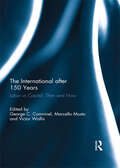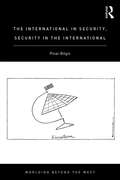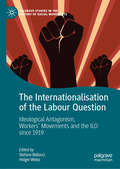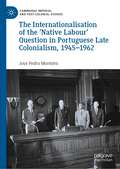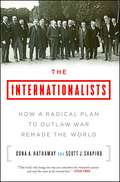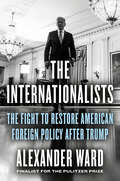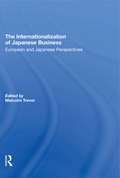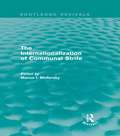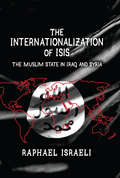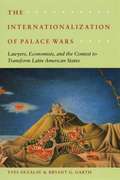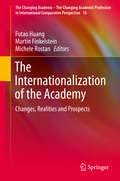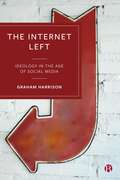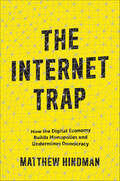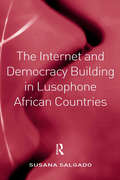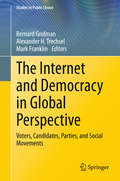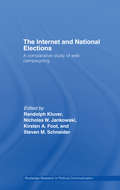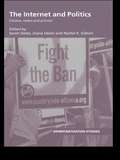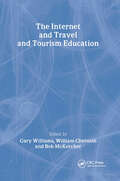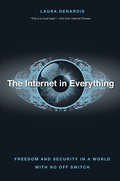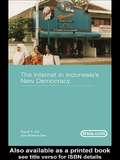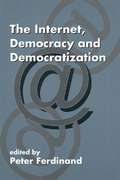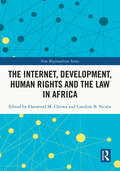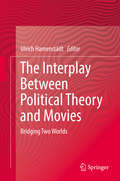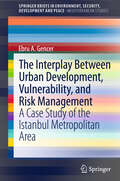- Table View
- List View
The International after 150 Years: Labor vs Capital, Then and Now
by George Comninel, Marcello Musto and Victor WallisThe International Workingmen’s Association was the prototype of all organizations of the Labour movement and the 150th anniversary of its birth (1864-2014) offers an important opportunity to rediscover its history and learn from its legacy.The International helped workers to grasp that the emancipation of labour could not be won in a single country but was a global objective. It also spread an awareness in their ranks that they had to achieve the goal themselves, through their own capacity for organization, rather than by delegating it to some other force; and that it was essential to overcome the capitalist system itself, since improvements within it, though necessary to pursue, would not eliminate exploitation and social injustice.This book reconsider the main issues broached or advanced by the International – such as labor rights, critiques of capitalism and the search for international solidarity – in light of present-day concerns. With the recent crisis of capitalism, that has sharpened more than before the division between capital and labour, the political legacy of the organization founded in London in 1864 has regained profound relevance, and its lessons are today more timely than ever.This book was published as a special issue of Socialism and Democracy.
The International in Security, Security in the International (Worlding Beyond the West)
by Pinar BilginInternational Relations continues to come under fire for its relative absence of international perspectives. In this exciting new volume, Pinar Bilgin encourages readers to consider both why and how ‘non-core’ geocultural sites allow us to think differently about key aspects of global politics. Seeking to further debates surrounding thinking beyond the 'West/non-West' divide, this book analyzes how scholarship on, and conceptions of, the international outside core contexts are tied up with peripheral actors’ search for security. Accordingly, Bilgin looks at core/periphery dynamics not only in terms of the production of knowledge in the production of IR scholarship, or material threats, but also peripheral actors' conceptions of the international in terms of 'standard of civilization' and their more contemporary guises, which she terms as ‘hierarchy in anarchical society’. The first three chapters provide a critical overview of the limits of ‘our’ theorizing about IR and security, as well as a discussion on the track record of critical approaches to IR and security in addressing those limits. The following three chapters offer one way of addressing the limits of ‘our’ theorizing about IR and security: by inquiring into the international in security, security in the international. Each of these chapters makes a theoretical point and illustrates this further in a spotlight section that further illustrates the point to aid student learning. A genuinely innovative contribution to this rapidly emerging field within IR, this book is essential reading for students and scholars of critical security, international relations theory and Global IR.
The Internationalisation of the Labour Question: Ideological Antagonism, Workers’ Movements and the ILO since 1919 (Palgrave Studies in the History of Social Movements)
by Stefano Bellucci Holger WeissThis edited collection is a global history of workers’ organisations since 1919, the year when the International Labour Organisation (ILO), the Comintern and the International Federation of Trade Unions were formed. This historical moment represents a caesura in labour history as it epitomises the beginning of what the editors and the contributors in this book call the internationalisation of the labour question. The case studies in this centenary volume analyse the relationship between global workers’ organisations and the new ideological confrontation between liberal capitalism, socialism and communism since the Bolshevik Revolution in Russia. Workers’ organisations, trade unions in particular, grew in importance and managed to organise internationally, forming alliances cemented by ideology and sustained by international institutional bodies or centrals. In the nascent capitalist versus communist struggle, trade unions thrived. Is it mere coincidence that today’s decline of unionism coincides with the end of ideological antagonism? This book emphasises important global labour issues such as gender as well as international workers’ histories from Latin America, Asia and Africa.
The Internationalisation of the ‘Native Labour' Question in Portuguese Late Colonialism, 1945–1962 (Cambridge Imperial and Post-Colonial Studies)
by José Pedro MonteiroThis volume addresses the ways the ‘native labour’ question in the Portuguese late colonial empire in Africa became a recurrent topic of international and transnational debate and regulation after the Second World War. As other European colonial empires were tentatively transforming their labour and social policies in the aftermath of the war, the Portuguese Empire in Africa resisted significant changes in this domain, preserving a strict dual labour regime. As a result, a growing number of individuals, networks and institutions abroad engaged with labour and social realities in Portuguese African colonies, giving origin to a series of instances of denunciation of labour-related abuses. Portuguese authorities responded to these initiatives by selectively engaging with international norms, languages and mechanisms. However, as global decolonisation gained momentum, international and transnational events and processes would significantly constrain Portuguese imperial and colonial decision-making procedures, with the aim of retaining the empire. Therefore, the ‘native labour’ question became in its own right a crucial political and diplomatic element of the broader struggles over the meaning of Portuguese imperial legitimacy. As this volume argues, these historical processes are critical to properly understanding the history of Portuguese late colonialism and its protracted trajectory of decolonisation.
The Internationalists: How a Radical Plan to Outlaw War Remade the World
by Scott J. Shapiro Oona A. HathawayA bold and provocative history of the men who fought to outlaw war and how an often overlooked treaty signed in 1928 was among the most transformative events in modern history.On a hot summer afternoon in 1928, the leaders of the world assembled in Paris to outlaw war. Within the year, the treaty signed that day, known as the Peace Pact, had been ratified by nearly every state in the world. War, for the first time in history, had become illegal the world over. But the promise of that summer day was fleeting. Within a decade of its signing, each state that had gathered in Paris to renounce war was at war. And in the century that followed, the Peace Pact was dismissed as an act of folly and an unmistakable failure. This book argues that that understanding is inaccurate, and that the Peace Pact ushered in a sustained march toward peace that lasts to this day. The Internationalists tells the story of the Peace Pact by placing it in the long history of international law from the seventeenth century through the present, tracing this rich history through a fascinating and diverse array of lawyers, politicians and intellectuals—Hugo Grotius, Nishi Amane, Salmon Levinson, James Shotwell, Sumner Welles, Carl Schmitt, Hersch Lauterpacht, and Sayyid Qutb. It tells of a centuries-long struggle of ideas over the role of war in a just world order. It details the brutal world of conflict the Peace Pact helped extinguish, and the subsequent era where tariffs and sanctions take the place of tanks and gunships. The Internationalists examines with renewed appreciation an international system that has outlawed wars of aggression and brought unprecedented stability to the world map. Accessible and gripping, this book will change the way we view the history of the twentieth century—and how we must work together to protect the global order the internationalists fought to make possible.
The Internationalists: The Fight to Restore American Foreign Policy After Trump
by Alexander WardThe inside story of Biden&’s foreign policy team and their struggle to restore America&’s global influence in the aftermath of TrumpWhen Joe Biden assumed the United States presidency, he brought with him a team of all-star talent, perhaps the most experienced ensemble of policy experts in modern U.S. history. Their mission: repair America&’s damaged reputation abroad and decide the course of its global future. The challenges and risks could not have been greater. Around the world, adversaries were consolidating power, allies were drifting away, wars were raging, and climate change was accelerating, all while Russia was disrupting democracies and China was seeking to replace the U.S. as the world&’s preeminent power. Now for the first time since World War II, the United States risked falling from its unrivaled position. If Biden and his team failed, it would likely mark the end of an American era and the rise of a fractured and autocratic world order. In The Internationalists, acclaimed national security reporter Alexander Ward takes us behind the scenes to reveal the struggle to enact a coherent and effective set of policies in a time of global crisis. Against the failure of Afghanistan and Russia&’s invasion of Ukraine, Biden&’s all-star team-of-rivals must band together against incredible odds. Their successes, and their failures, will decide not just Biden&’s presidency. They will decide the very course of America&’s global future. As The Best and The Brightest chronicled the smoke-filled rooms of the Kennedy Administration, and The Rise of The Vulcans detailed the inner workings of George Bush's war machine, The Internationalists takes readers behind the scenes as Joe Biden and his cabinet embark on some of the most ambitious foreign policy initiatives of any president since Richard M. Nixon. Thanks to rigorous reporting and sources in the rooms where it happened, Ward delivers the first draft of history, the first definitive, unvarnished account of the Biden Doctrine, from the Fall of Kabul to the Rise of Kiev.
The Internationalization Of Japanese Business: European And Japanese Perspectives
by Malcolm TrevorThis book examines the progress of internationalisation of European and Japanese business in four different fields: the commodities and service trade, capital transfers, enterprise management, and information and culture.
The Internationalization of Communal Strife (Routledge Revivals)
by Manus I. MidlarskyFirst published in 1992, this edited collection argues that conflicts have a growing tendency both to intensify and to lengthen, thus increasing the likelihood of external actors being drawn into the on-going violence. Here, leading experts in comparative and international politics examine this tendency of communal conflicts to spill over into the international arena. They also look at the conditions under which these processes do not occur and are mediated successfully. The authors combine theoretical perspectives with case studies, covering examples from the origins of the First World War, to state building in Iraq, and whether it was a precursor of the Iran-Iraq War and the Gulf Crisis. They present both a global overview and a focus on the state as the single most important intermediary in the internationalization process. A comprehensive and relevant reissue, this volume will appeal to students and scholars of International Relations, Comparative Politics and Strategic Studies.
The Internationalization of East Asian Higher Education: Globalization’s Impact (International and Development Education)
by John D. Palmer Amy Roberts Young Ha Cho Gregory S. ChingDevelops new and intriguing insights into globalization theory and internationalization practice, expanding the investigation of East Asian values and contexts in comparison and separate from Western-dominant thoughts of globalization and internationalization in higher education.
The Internationalization of ISIS: The Muslim State in Iraq and Syria
by Raphael IsraeliAn Islamic terrorist movement, ISIS (also dubbed IS or ISIL), has taken advantage of the chaotic "Arab Spring" in Syria and Iraq to declare an Islamic Caliphate wherever it has been able to rise to power. This movement is continuously attempting to extend the territory of its rule. The Egyptian Sinai Peninsula and the Libyan post-Qaddafi desert country have sworn allegiance to the Caliphate and every town that is captured by the fighting forces of ISIS is forced to submit to strict Islamic law.The Caliphate movement is constantly increasing its power and influence. It is not only sustained by the thousands of local recruits, but it is reinforced by many thousands of Muslim minority youth dwelling abroad. These youths are charmed by the "purity" of its ideals and goals, its brutal and coercive ways, and its defiance of the West.The United States, some "moderate" Arab allies in the Gulf, and some other international players, including Russia, have launched attacks against the ISIS forces to prevent them from further destroying the ancient cultures of Mosul and Palmyra, dedicated by UNESCO as part of the world heritage. Beyond that there does not seem to be any force capable of arresting their advance or checking their universal appeal to Muslims around the world. Israeli's pessimistic conclusion is that ISIS may be contending for power in the Middle East for many years to come, while threatening to become a centre of terrorist activity against the West.
The Internationalization of Palace Wars: Lawyers, Economists, and the Contest to Transform Latin American States
by Dezalay Yves Garth Bryant G.How does globalization work? Focusing on Latin America, Yves Dezalay and Bryant G. Garth show that exports of expertise and ideals from the United States to Argentina, Brazil, Chile, and Mexico have played a crucial role in transforming their state forms and economies since World War II. Based on more than 300 extensive interviews with major players in governments, foundations, law firms, universities, and think tanks, Dezalay and Garth examine both the production of northern exports such as neoliberal economics and international human rights law and the ways they are received south of the United States. They find that the content of what is exported and how it fares are profoundly shaped by domestic struggles for power and influence-"palace wars"-in the nations involved. For instance, challenges to the eastern intellectual establishment influenced the Reagan-era export of University of Chicago-style neoliberal economics to Chile, where it enjoyed a warm reception from Pinochet and his allies because they could use it to discredit the previous regime. Innovative and sophisticated, The Internationalization of Palace Wars offers much needed concrete information about the transnational processes that shape our world.
The Internationalization of the Academy
by Futao Huang Martin Finkelstein Michele RostanThis volume provides a nuanced empirical assessment of the extent to which the academic profession is internationalized at the beginning of the 21st century. It indicates which are the most internationalized academic activities, and focuses on specific topics such as physical mobility for study or professional purposes, teaching abroad or in another language, research collaboration with foreign colleagues, and publication and dissemination outside one's native country or in another language. It places the main theme in the wider context of the history of higher education's internationalization. It provides explanations on what drives and deters academics from international activity, and documents some of the consequences that internationalization has on academic work and productivity. This study is based on a survey of 25,000 academics working at higher education institutions in 18 countries and Hong Kong on five continents. Comparing data from the 1992 Carnegie International study to the 2007 CAP survey, relying on respondents' perceptions of change, and comparing different academic generations, it offers valuable insights on changes in the internationalization of the academy.
The Internet Left: Ideology in the Age of Social Media
by Graham HarrisonDefying the current pessimistic narrative, this book challenges the prevailing assumptions that the political Left is spent, hopeful ideological discourse has collapsed and social media has corroded public debates about politics. Instead, the book argues that ideological activism remains vibrant on the Left, but there is currently no clear way of recognising and analysing this phenomenon. The book fills this gap by first defining what political social media is and then by taking a morphological approach to investigating political ideologies and revealing the ways in which interconnected concepts are arranged. It concludes by coining the term ‘proto-ideologies’ to approach the construction of concepts that generate ideologies in the making.
The Internet Trap: How the Digital Economy Builds Monopolies and Undermines Democracy
by Matthew HindmanA book that challenges everything you thought you knew about the online economyThe internet was supposed to fragment audiences and make media monopolies impossible. Instead, behemoths like Google and Facebook now dominate the time we spend online—and grab all the profits from the attention economy. The Internet Trap explains how this happened. This provocative and timely book sheds light on the stunning rise of the digital giants and the online struggles of nearly everyone else—and reveals what small players can do to survive in a game that is rigged against them.Matthew Hindman shows how seemingly tiny advantages in attracting users can snowball over time. The internet has not reduced the cost of reaching audiences—it has merely shifted who pays and how. Challenging some of the most enduring myths of digital life, Hindman explains why the internet is not the postindustrial technology that has been sold to the public, how it has become mathematically impossible for grad students in a garage to beat Google, and why net neutrality alone is no guarantee of an open internet. He also explains why the challenges for local digital news outlets and other small players are worse than they appear and demonstrates what it really takes to grow a digital audience and stay alive in today’s online economy.The Internet Trap shows why, even on the internet, there is still no such thing as a free audience.
The Internet and Democracy Building in Lusophone African Countries
by Susana SalgadoThis timely book fills an important gap in the literature on the influence of the Internet and new media in Portuguese speaking African countries. Based on extensive field work throughout the region the author examines the influence of the Internet in the transition to democracy in Africa, and asks whether there are new possibilities for popular activism to emerge from evolving communication environments and media systems. The book analyses the different forms of democracy, the concept of development, and addresses the debate about the relationship between democracy and development and explores the influence of the media in the democratization process, the promises that digital media bring to this process and to development and the implications of the African digital divide. In certain countries in this region democracy and independent news media are in their infancy but are starting to take hold, giving an excellent opportunity to observe the dynamics of civil society and the influence of increased freedom, new voting powers and new media in particular. The book offers important insights into the roles and functions that the media in general, and the Internet in particular, can perform in the creation of a more democratic society, as well as in empowering and educating citizens in democratic values.
The Internet and Democracy in Global Perspective
by Bernard Grofman Alexander H. Trechsel Mark FranklinThis volume provides an important update to our current understanding of politics and the internet in a variety of new contexts, both geographically and institutionally. The subject of e-democracy has morphed over the years from speculative and optimistic accounts of a future heightened direct citizen involvement in political decision-making and an increasingly withered state apparatus, to more prosaic investigations of party and governmental website content and micro level analyses of voters' online activities. Rather than levelling the communications and participation playing field, most studies concluded that existing patterns of bias and power distribution were being repeated online, with the one exception of a genuine change in the potential for protest and e-activism. Across all of these accounts, the question remains whether the internet is a levelling communication tool that elevates the profile of marginalised players in the political system, or whether it is a medium that simply reinforces existing power and participatory biases. While employing case studies from various global perspectives, this book investigates the role of digital media and competitive advantage, campaigns and the effect of social media, online communication as way of fomenting nonviolent revolutions and the undeniable and important role of the internet on democracy around the world.
The Internet and National Elections: A Comparative Study of Web Campaigning (Routledge Research in Political Communication)
by Randolph Kluver Nicholas W. Jankowski Kirsten A. Foot Steven M. SchneiderThis volume provides a comparative analysis of the use of the World Wide Web in countries around the world for political campaign purposes. Drawing upon a common conceptual framework - the ‘Web sphere,’ and a shared methodological approach called Web feature analysis - in order to examine how the Internet is used by a variety of political actors during periods of electoral activity. Research teams around the world conducted analyses in technologically advanced nations, as well as those with low Internet diffusion, and a variety of countries in the middle range of network penetration, and from a variety of political and cultural contexts. The book represents an important contribution towards gaining a cross-national understanding of the current and emerging impacts of the Internet on political practice. To that end, the contributors collect and analyze data related to the structure for political action and information provision. They examine twelve types of political actors engaged in elections, including candidates, parties, non-governmental organizations, government, media and individual citizens. Exploring the complex dynamics between politics, culture, and information technology at both the national and global levels, The Internet and National Elections will be of interest to students and researchers of political science, communication studies, international relations, media and Internet studies.
The Internet and Politics: Citizens, Voters and Activists (Democratization Studies)
by Diana Owen Sarah Oates Rachel K GibsonThis volume explores the nature of the Internet's impact on civil society, addressing the following central questions: is the Internet qualitatively different from the more traditional forms of the media? has the Internet demonstrated real potential to improve civil society through a wider provision of information, an enhancement of communication between government and citizen, or via better state transparency? does the Internet pose a threat to the coherence of civil society as people are encouraged to abandon shared media experiences and pursue narrow interests? in authoritarian states, does the Internet function as a beacon for free speech or as another tool for propaganda?
The Internet and Travel and Tourism Education
by Gary Williams Bob Mckercher William ChernishDesign and implement successful Web-based courses!This wide-ranging book discusses both the micro and macro aspects of using the Internet to enhance your travel and tourism curriculum. The Internet and Travel and Tourism Education offers useful insights for both novices and experienced users. With these suggestions, you can use online resources to contribute to your class objectives. The innovative teaching strategies presented in The Internet and Travel and Tourism Education will not soon become outdated. Instead of being based on fast-changing technical details, such as specific programs, the ideas are rooted in the way information is presented and absorbed. By tapping the power of the Internet, you can find more effective ways to teach the skills and facts your students need. The Internet and Travel and Tourism Education provides helpful advice and information on essential aspects of this powerful tool, including: Web-based instruction students’perceptions of Internet courses using the Web to expand content areas an Internet-based master?s degree program administrative issues managing multimedia projects The Internet and Travel and Tourism Education will help you offer the best possible education for your students and stay up-to-date in an increasingly competitive world.
The Internet in Everything: Freedom and Security in a World with No Off Switch
by Laura DeNardisA compelling argument that the Internet of things threatens human rights and security and that suggests policy prescriptions to protect our future The Internet has leapt from human-facing display screens into the material objects all around us. In this so-called Internet of Things—connecting everything from cars to cardiac monitors to home appliances—there is no longer a meaningful distinction between physical and virtual worlds. Everything is connected. The social and economic benefits are tremendous, but there is a downside: an outage in cyberspace can result not only in a loss of communication but also potentially a loss of life. Control of this infrastructure has become a proxy for political power, since countries can easily reach across borders to disrupt real-world systems. Laura DeNardis argues that this diffusion of the Internet into the physical world radically escalates governance concerns around privacy, discrimination, human safety, democracy, and national security, and she offers new cyber-policy solutions. In her discussion, she makes visible the sinews of power already embedded in our technology and explores how hidden technical governance arrangements will become the constitution of our future.
The Internet in Indonesia's New Democracy (Asia's Transformations/Asia.com)
by Krishna Sen David T. HillThe Internet in Indonesia’s New Democracy is a detailed study of legal, economic, political and cultural practices surrounding the provision and consumption of the Internet in Indonesia at the turn of the twenty-first century. Hill and Sen detail the emergence of the Internet into Indonesia in the mid-1990s, and cover its growth through the dramatic economic and political crises of 1997 and the subsequent transition to democracy. Conceptually the Internet is seen as a global phenomenon, with global implications, however this book develops a way of thinking about the Internet within the limits of geo-political categories of nations and provinces. The political turmoil in Indonesia provides a unique context in which to understand the specific local and national consequences of a global, universal technology.
The Internet, Democracy and Democratization (Democratization Studies)
by Peter FerdinandThe Internet is transforming relations between states and citizens. This study gives examples of how it is creating new political communities at various levels, both in democracies and authoritarian regimes. It is also used by marginalized anti-democratic groups such as neo-Nazis.
The Internet, Development, Human Rights and the Law in Africa (New Regionalisms Series)
by Caroline B. Ncube Danwood M. ChirwaThis book tracks and critiques the impact of the internet in Africa. It explores the legal policy implications of, and legal responses to, the internet in matters straddling human rights, development, trade, criminal law, intellectual property, and social justice from the perspective of several African countries and the region. Well-known and emerging African scholars consider whether access to the internet is a human right, the implications on the right to privacy, e-commerce, cybercrime, the opportunities and dangers of admitting electronic evidence, the balancing of freedom of expression with the protection of intellectual property, and how different African legal systems address this tension. This book will be an invaluable resource for a wide range of stakeholders, including researchers, scholars and postgraduate students; policymakers and legislators; lawyers and judicial officers; crime-fighting agencies; national human rights institutions; civil society organisations; international and regional organisations; and human rights monitoring bodies.
The Interplay Between Political Theory and Movies: Bridging Two Worlds
by Ulrich HamenstädtThis book presents essays and scientific contributions examining the link between popular media and politics. The essays focus on the question of how political and social change, concepts of power, and utopian elements are reflected in selected films and television series. The book applies a political science perspective, covering theories from political philosophy, political sociology and international relations, and examines a wide range of movies and TV series, such as The Godfather, Fight Club, The Walking Dead and Game of Thrones. It will appeal to anyone interested in studying how political ideas, concepts and messages can be illustrated and visualized using the complex media of movies and TV series.
The Interplay between Urban Development, Vulnerability, and Risk Management
by Ebru A. GencerNatural disasters are increasingly affecting the world, taking lives unexpectedly and leaving many others injured and homeless. Moreover, disasters disrupt local, national and even global economies, instantly changing the direction of development. In the first half of 2011 alone, 108 natural disasters occurred, killing over 23 thousand people, affecting nearly 44 million others and causing more than 253 billion US dollars of economic damages (CRED 2011,1). Large urban settlements have become increasingly vulnerable to the impacts of natural disasters. The concentration of substandard infrastructure and housing, material assets, and inherent socio-economic inequalities increase vulnerability to disasters in large urban areas, especially in developing countries. The size, number, functions, and geographical distribution of large- and megacities create a special concern for disaster risk. Good urban management practices can be a powerful catalyst for reducing losses from natural disasters, while simultaneously helping to develop a sustainable environment. Yet, the existing situation indicates that sustainable planning and risk management measures are not taken into consideration or may not be put into practice for a variety of financial, political, and social reasons. This book argues that, on one hand, socio-economic disparities resulting from unsustainable urban development can increase vulnerability to natural hazards, and on the other hand, when paired with natural hazards this increased vulnerability can negatively affect urban areas, resulting in further inequality. This book will showcase this argument with theoretical reviews and quantitative analyses on the interplay between sustainable development and disaster vulnerability as well as an in-depth case study of the role of urban planning and risk management practices in creating the socio-economic and spatial vulnerabilities and predicted earthquake risk in the megacity of Istanbul.
